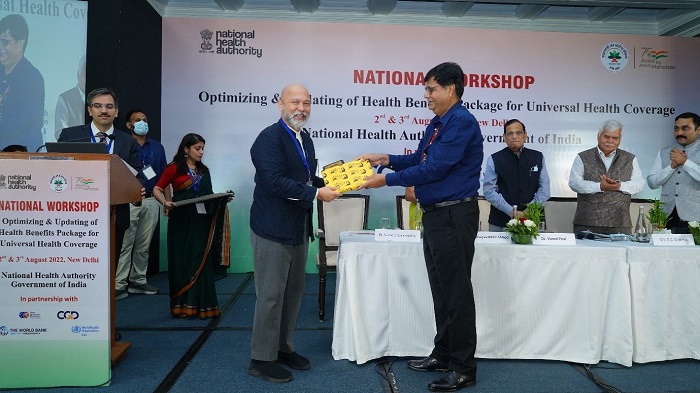NHA and WHO Strengthen Health Benefits Package
India’s National Health Authority (NHA), the implementing agency for the government’s flagship Ayushman Bharat Pradhan Mantri Jan Arogya Yojana (AB-PMJAY) programme, together with World Health Organization and other partners including the Centre for Global Development and World Bank, organized a knowledge-sharing workshop on optimizing and updating Health Benefits Package for Universal Health Coverage (UHC) in New Delhi from 2-3 August. UHC aims to provide cashless access to quality health services to beneficiaries to reduce financial hardship related to catastrophic healthcare expenditure.
The workshop was attended by officials from the State Health Agencies as well as experts from India and other countries, who shared experiences to draw lessons and best practices to enable greater equity and efficiency of spending.
The Senior Officials from the National Health Authority acknowledged the support that WHO has provided for the rollout of new International Classification of Diseases (ICD-11) and International Classification of Health Interventions (ICHI). Dr Roderico Ofrin, WHO Representative to India, while addressing the inaugural session commended the work being undertaken by NHA on transitioning to an evidence-based approach for scheme strengthening. He reaffirmed WHO’s continued support and commitment in contributing to this transition by supporting NHA on expanding use of the ICD-11 and ICHI medical coding systems within the scheme. Dr Ofrin further highlighted the critical role of ICD-11 and ICHI in improving health information through better population level data on death and diseases and in turn strengthen service delivery systems.

Dr Roderico H. Ofrin, WHO Representative to India with Mr R S Sharma, CEO, NHA; Dr Vinod Paul, Member (Health) Niti Aayog; Dr Praveen Gedam, Additional CEO, NHA; and Dr Ghayas Uddin Ahmed, Financial Advisor, NHA, at the workshop on Health Benefits Package for Universal Health Coverage in New Delhi.© WHO India
AB-PMJAY was launched to achieve the vision of UHC and has been designed to meet Sustainable Development Goals and the commitment to "leave no one behind." The programme aims to provide comprehensive need-based health care services by adopting a continuum of care approach.
WHO has been working closely with NHA to support training and capacity building of officials on ICD-11 and ICHI as well as provided technical assistance on IT integration of these medical coding systems through deployment of resource persons in the states of Chhattisgarh and Maharashtra.
WHO has been partnering with NHA to advocate for the adoption of ICD-11 and ICHI and participated in the MEDRECON conference at AIIMS Raipur earlier this year, which focused on the importance of medical records and health information for achieving better health.
